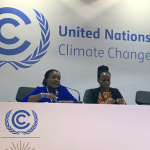As the world’s largest climate summit and negotiations, COP27, continues in the Red Sea Riviera town of Sharm El Sheikh, Egypt, The Alliance for Food Sovereignty in Africa (AFSA) is pleased to officially launch the publication of “THE CLIMATE EMERGENCY: How Africa can Survive and Thrive” a new book in the Barefoot Guide Agroecology Series.
The official book launch will be accompanied by a side event organized by AFSA titled “Building An African Food Policy for Sustainable and Resilient Food Systems.”
This book takes you on a unique journey through Africa’s diverse food systems and the threats they face as a result of the climate emergency, as well as the industrial food system’s barrage of false climate solutions. Aside from the doom and gloom, this book offers stories of hope and regeneration from African farmers, pastoralists, fishers, indigenous peoples, women, and youth from all over the continent.
The climate emergency affects us all deeply, in so many ways. But for farmers it has more drastic implications. It undermines all aspects of the food systems that they depend on. Extreme weather devastates their crops and livestock, and destabilises the very water cycle that they are intimately a part of.
Scientists project that things will only get worse for Africa if current trends continue. Estimates suggest that climate change will reduce Africa’s overall food production capacity by ten to twenty percent. Around 70 percent of Africans rely on rain-fed farming, meaning hundreds of millions of people will be severely affected by climate-driven droughts, heatwaves, and other natural disasters. As farmers, fisherfolks and pastoralists face serious challenges to growing and harvesting food—from frequent droughts to rising sea temperatures—they must adapt to climate change to feed their communities.
“Today, the majority of the solutions put forth and funded by governments and donors to address these problems are, in the long run, making things worse,” said Bridget Mugambe, AFSA’s program coordinator. “Industrial agricultural methods, dubbed “Climate Smart Agriculture,” promote the use of excessive chemical inputs on plants and in the soil. Carbon credit programs are being developed to legitimize pollution and to uproot communities from their land. These are just a few examples of the false solutions brought by the rich and the powerful”
In Africa, however, a different narrative is at work. The stories in this AFSA Barefoot Guide demonstrate that African farmers, long viewed as victims, are beginning to implement long-term, sustainable solutions to Africa’s climate crisis. Indeed, they are models that all farmers could learn from. “Through agroecology practices, they can not only naturally adapt to the inevitable and growing harm of the climate crisis, but they can also make significant contributions to its mitigation,” Bridget added.
AFSA stands fully behind farmers, pastoralists, fisherfolk and all who support them in learning and working together, so that not only can they survive the climate emergency, but thrive!
Happy Reading!


































[…] countries adapt to an increasingly dangerous climate. As AFSA shows in a great new report, “The Climate Emergency: How Africa can Survive and Thrive”, they are pushing back against efforts by the U.S. government and others to promote […]
[…] in the long run, making things worse,” Bridget Mugambe, AFSA’s program coordinator, said in a statement on the group’s website. “Industrial agricultural methods, dubbed ‘Climate Smart […]